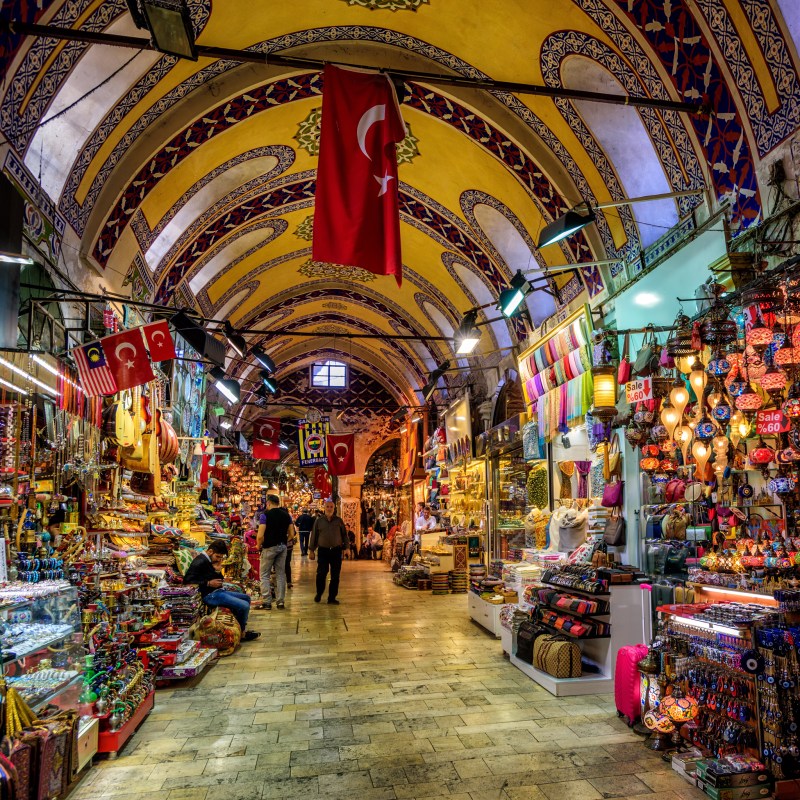
Because the United States Constitution calls for the separation of church and state, it is quite a different experience for an American to travel to a country with an official religion, whether it’s Christianity, Buddhism, or Islam. Approximately 20 percent of the world’s nations have an official state religion, and the majority of those are Arab countries in the Middle East.
Videos by TravelAwaits
One of the many benefits of travel is the opportunity to expand your horizons and experience different cultures. While most people embrace cultural sensitivity and appreciate that our big world is full of different perspectives and customs, it’s only natural to default to one’s own cultural norms. And when the rules of etiquette and behavior in one’s home country differ from those of another nation, it’s incredibly important to be mindful of the local culture.
I had the opportunity to visit Turkey and the United Arab Emirates a few years ago. And while both countries are known to be more liberal than others in the region, I found that adhering to the following rules helped me explore ancient temples, negotiate bargains in souks, and marvel at modern architectural masterpieces like a local.

1. Dress Modestly
When I visited Dubai in January, it was a pleasant 80 degrees. In the U.S., tourists flocking to a sunny seaside destination would be sporting shorts, tank tops, and sundresses that expose legs, shoulders, and maybe a little cleavage. But this is an absolute no-no in the Middle East.
Both men and women should dress modestly in the Middle East, keeping shoulders and knees covered and not wearing anything that is too tight or revealing. Women can beat the heat while respecting the local culture by donning long but loose-fitting clothing like maxi dresses, long skirts, and palazzo pants. It’s best that men wear pants and collared shirts, but if shorts are worn, they should be cargo-style, extending past the knees.
While foreign women aren’t expected to cover their hair out in public, I recommend packing a wide, lightweight scarf when traveling to the Middle East and carrying it with you. If you forget to pack a scarf, you’ll find many colorful options available at the Grand Bazaar in Istanbul or the souks throughout the region.

2. Keep These Things In Mind When Visiting A Mosque
Perhaps because my parents made a point of exploring the grand cathedrals and medieval churches of Europe, I was curious to step inside a mosque during my trip to the Middle East.
Before entering a mosque, women are expected to cover their hair, and everyone who enters is expected to remove their shoes. Mosques that are popular with tourists recognize that many Western women don’t wear or carry headscarves and will hand out loaner head coverings. (I prefer to use my own scarf, which is why I recommend carrying one at all times when visiting the Middle East.) Mosques that are frequented by tourists will often distribute small plastic bags that you can use to carry your shoes while visiting.
Inside the mosque, non-Muslims are not allowed to roam freely. Rather, they must remain on the perimeter. As in all places of worship, from cathedrals to synagogues to mosques, visitors should be quiet and reserved when on the premises, especially during religious services.

3. Avoid Public Displays Of Affection
While it’s considered impolite to make out in public in Western countries across Europe and North America, nearly all public displays of affection are frowned upon in the Middle East. Even something as innocent as holding hands in public can be illegal in the Arab world if you’re not married.
To respect the local customs (and laws), never hug or kiss in public. To stay on the safe side, refrain from holding hands, especially when shopping, dining, and exploring. If you’re ever tempted to steal a little sugar from your better half, prominently posted signs will remind you that it’s taboo!
4. Watch How You Refer To Your Main Squeeze
If you’re visiting the Middle East with a significant other to whom you’re not married, be sure to refer to one another as “husband” and “wife” rather than “life partner,” “boyfriend,” or “girlfriend.” This is especially important when checking into a hotel. Even in more liberal Middle Eastern countries like the United Arab Emirates, it’s illegal under Islamic law for unmarried couples to live together or share a hotel room.
As is the case at most hotels around the world, you’ll be required to show your passports when you check in. While different surnames may suggest that a couple is unmarried in some countries in the West, that usually isn’t a red flag in the Middle East.

5. Use Your Left Hand Sparingly
In Arab culture, the left hand is used for toileting and is widely considered to be unclean. Therefore, even southpaws should use their left hands sparingly when visiting the Middle East.
Whether grabbing a burger in the food court at the Dubai Mall, splurging at a Michelin-starred restaurant, or enjoying something in between, you should never touch food with your left hand in the Middle East. So learn to eat a Big Mac with one hand and move your fork to your right side if you typically eat continental style.
Whether you’re handing your passport to a customs agent or distributing printouts to work colleagues, be sure to use your right hand in the Middle East.
6. Drink In Moderation
Most Muslims do not drink alcohol, but wine, beer, and spirits are readily available in restaurants, bars, and shops in some Arab nations. While visitors are permitted to enjoy a drink in places like Egypt, Jordan, Morocco, and Tunisia, getting drunk is socially unacceptable.

7. Note That Some Areas Are For Ladies Only
The Dubai Metro is a fast, safe, and convenient way to travel to the city’s most popular spots. In addition to being incredibly clean and affordable, this mode of public transportation has a cabin reserved for women and children.
Although multiple signs mark this dedicated space, the rule isn’t strictly enforced. During one of my trips on the Dubai Metro, I watched a female metro employee politely inform a Middle Eastern man sitting with several women and children that he needed to move to another compartment. The man completely ignored her, not even making eye contact or acknowledging her presence, until a male employee appeared, had the same conversation with him, and started to write the rule breaker a ticket.
Throughout the Middle East, you’ll also encounter women-only establishments, most notably beauty salons, spas, and makeup boutiques. Because most Middle Eastern women keep their heads and necks covered when they are outside of their homes, having dedicated spaces with frosted windows allows them to remove their scarves and let their hair down.
8. Respect The Local Greeting Customs
While shaking hands, hugging, and social kissing are common ways of greeting members of either sex in the West, the norms are quite different in the Middle East.
Kissing, as practiced socially throughout Europe, is out of the question between men and women, but it’s not uncommon for Middle Eastern men to greet one another with a hug or kiss one another on the cheeks. And while their grip is typically less firm, Middle Eastern men will routinely greet Western men with a handshake.
But it is considered impolite for a Middle Eastern man to extend his hand to a woman outside of his family. If you are a Western woman, being the first to extend your hand for a handshake indicates that you are comfortable with this gesture by a man who is not a close family member. Or, as an alternative, you can simply say hello and nod politely. In response, your Middle Eastern colleague may place his hand over his heart (as Americans do during the national anthem).
The cultural differences between the Middle East and the West are significant and can be a bit jarring, but keeping the local etiquette in mind will go a long way toward helping you make the most of your visit.
